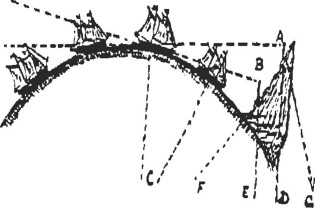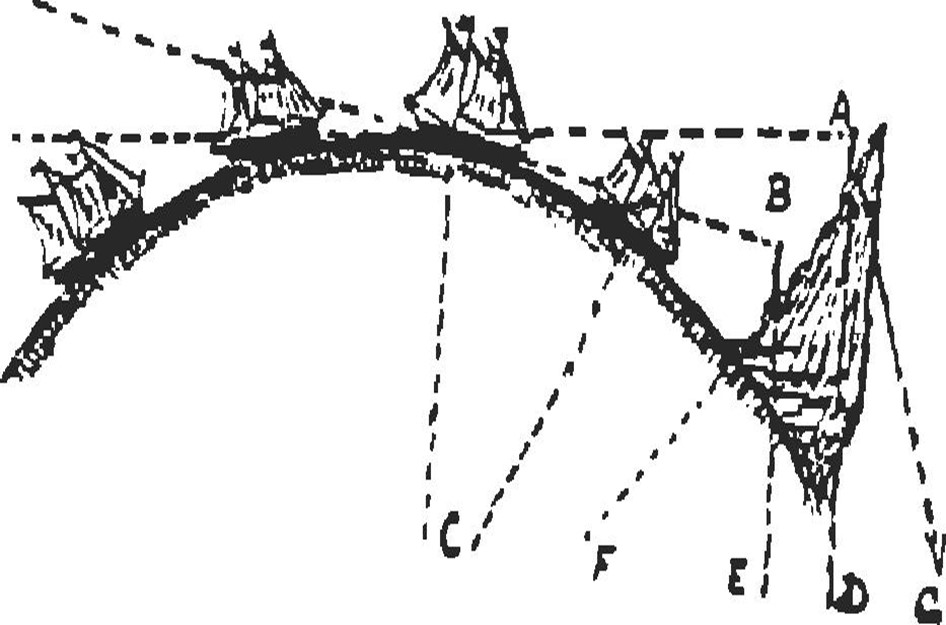Perspective True or False
Some of the Laws of Perspective are given in the last Flat Earth News, so that we need not here enlarge thereon; but as they are important, we briefly recapitulate them.
1 All parallel lines, like those of a railway, seem to approach, and finally to meet in the distance.
2 Straight lines above the eye of the spectator appear to descend to the eye-line.
3 The horizontal, or eye-line, is a straight line on a level with the eye, at whatever elevation the spectator may be.
4 Lines, or objects. below the eye-line, remaining at the same level, seem to rise as they recede, until they vanish in the eye-line.
5 Similarly, lines or objects above the height of spectator, and maintaining a constant altitude, appear to descend until they are lost in the eye-line.
6 Objects, or lines, do not all vanish at the same point in the horizontal line, but the nearer they are to that line, the sooner they vanish in it, because of the smaller angle they make with it.
7 The distant horizon being always on a level with the eye, whatever be the altitude of the observer, it seems to rise, or to fall, with the observer; but h4 never has to depress his vision to look downwards towards it, nor raise his line of sight upwards to it.
Now let us apply these rules, which are the Laws of true Perspective. to the disappearance of ships at sea, as illustrated in zetetic diagrams, and violated in those of the globularist. Fig. 10 on the title page. The intelligent reader will soon see that this diagram harmonizes with and illustrates, the first six rules above given. The hull of the vessel, being nearer the eye-line, vanishes according to rule six, before the flags and upper sail which are farther from it, because the lower angle is the lesser. Further, the hull rides on a dark background of water, while the upper masts and sails are often against a bright sky! But the ship never goes over, and then down on the further side of a bulge, or a hill of water; for in clear weather a good telescope, which magnifies the distant angle of vision, brings again the ship’s hull in sight. Had the ship gone over and beyond the supposed dip, or curvature, no telescope could fetch it back again; and when on the crest of the supposed hill of water the hull itself should become visible against the background of clear sky! But in harmony with rule 4, ships never so disappear, because there is no real rise or protuberance in a calm sea, which can be abundantly shown is everywhere level or horizontal.
Let us now turn to the false perspective sometimes given in globite diagrams, and geographical works.
Our figure (below) is taken from a school book; and in Scott’s Astronomy there is another on the same principal, or rather, on the same lack of principal. This diagram violates every law of true perspective. The observer at A is made to look down to his distant horizon, and so is the one at B, though in the diagram he appears to look up. This is a double violation of rule 7 as given above. And, further, the reader will notice how the line of the observer is not pointing towards the centre, as It should be if the earth be globular. The diagram is inaccurate and false.

Suppose the observer at A were to turn round and to look downwards in the opposite direction towards C, what would he see? An awful chasm at which the stoutest heart would quail! The thing, and ideas it represents. are a disgrace to modern education! Is it any wonder, therefore, that a famous writer like Goethe should say, “I curse this modern theory of Cosmogony, and hope that perchance there may appear some strong scientists of genius who will take up courage to upset this universally disseminated delirium of lunatics.” — (The Scientific American, April 27th, 1878.)
This article has been archived for your research. The original version from Christian Flat Earth Ministry can be found here.




